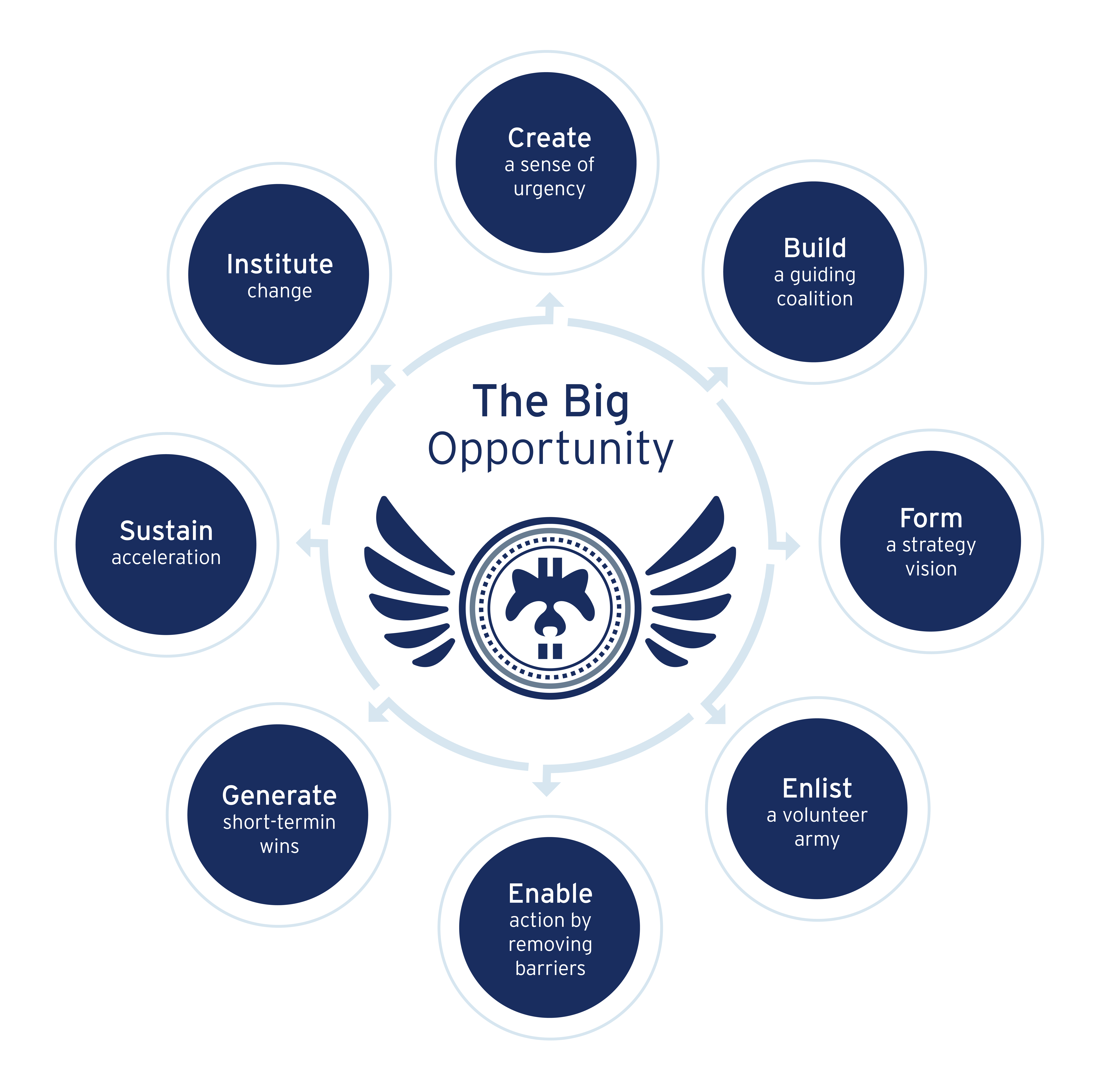Corporate Culture as the Playing Field
Success Strategies for Sustainable Change

Our experiences from nearly 40 years in consulting and daily interactions with people in companies have shown us that corporate culture plays an increasingly significant role in sustainable change and holistic business transformations, especially in today's times of ever-accelerating change.

Birgit Weber

Patrick M. Wanner
What is Corporate Culture?
Corporate culture, also known as organizational culture, is the set of shared values, norms, and attitudes that shape the decisions, actions, and behavior of an organization's members (Lies 2014).
The primary goal of corporate culture is to create a framework that influences behavior and shapes the company's reputation. The actions of an organization are perceived not only by its internal members but also by external observers such as customers, banks, and policymakers, significantly contributing to the perception and image of the company (Lies 2014).
The Role of Corporate Culture in the Modern Business World
A strong and positive corporate culture not only enhances internal collaboration and employee satisfaction but also improves a company's external image and reputation. Corporate culture influences all aspects of business life, from employee leadership and customer interactions to the ability to innovate and adapt to change. It is crucial to recognize that a deep understanding and deliberate nurturing of corporate culture significantly affect how flexibly and successfully a company responds to market challenges.
Therefore, corporate culture is far more than just an abstract or theoretical concept. It is a living part of every organization that plays a critical role in the achievement or non-achievement of business goals. By fostering a tangible, positive, and adaptable culture, companies and their leaders can motivate their employees and thereby strengthen their readiness for change.
Research also shows that a positive corporate culture significantly improves employee satisfaction and retention. According to a 2022 study by Quantum Workplace, companies with a strong corporate culture (clear values that are shared and lived by employees) see twenty-three percent higher profits and an eighteen percent increase in productivity. This is because employees who identify with their company's values and goals work more engaged and productively. Sustainable change, supported by a strong corporate culture, can thus make all the difference between a company's success or failure (Heinz 2023). Likewise, the adaptability of a corporate culture can determine the success or failure of change initiatives.
Adaptable Corporate Culture as the Key to Sustainable Change
Since the 1980s, scientific studies have investigated how a company's culture affects its economic success. The results indicate that an adaptable corporate culture is essential to meet the present and future challenges of the market, technology, and society. A flexible corporate culture helps companies realize their vision and mission through innovative products and services and better adapt to changing conditions (Lattmann 2014).
Research by Kotter International, Inc. (2024) also shows that adaptable organizations have consistently outperformed their competitors for the past three decades. There is a direct correlation between adaptable organizations and financial as well as strategic success. Companies that prioritize the development of their employees' adaptability see a measurable return on this investment, both in employee behavior and in business outcomes.
- 4 times higher revenue growth
- 8 times higher employment growth
- 750 times higher net profit growth
Challenges in Cultural Transformation
Cultural transformation in organizations is a highly complex task for leaders and presents them with sometimes very significant challenges (Handelsblatt 2019):
- Underestimated Influence of Activism and Cultural Blindness: Initiators of cultural transformation often tend to underestimate the impact of activism and cultural blindness.
- Lack of Commitment: Management frequently fails to create a solid commitment to the cultural transformation.
- Half-hearted Engagement with the Existing Culture: Leaders often engage only half-heartedly with the existing culture.
- Unprofessional Formulation of Cultural Expectations: The formulation of cultural expectations is often unprofessional.
- Delegating Cultural Transformation to Others: Leaders often delegate the implementation of cultural transformation to others.
Moreover, an existing corporate culture can often be an obstacle to change projects. It may be too rigid or too traditional, providing little room for disruptive or competitive initiatives. Therefore, it is essential to actively foster an adaptable culture to enable faster and more radical innovations in today's world (Lattmann 2019).
Success Strategies for an Adaptable Culture and Sustainable Change
By combining proven change management approaches like Kotter's 8 Accelerators with a holistic approach such as the Tiba Holistic Change Management®, companies can foster an adaptable corporate culture and ensure that changes are not only implemented but also sustainably embedded. These two approaches help develop a corporate culture that supports change and prioritizes the change capability of its employees.

Figure 1: Kotter's 8 Accelerators (own representation based on Kotter International, Inc. 2024)
Kotter's 8 Accelerators
John Kotter, one of the leading experts in the field of change management since the 1980s, developed a structured approach in response to the high failure rates of change projects to increase the success rate of change initiatives. Initially known as the linear and sequential 8-step model, Kotter later evolved his approach into the 8 Accelerators—a cyclical, iterative, dynamic, and flexible model—in response to the increased volume and speed of change (see Figure 1).
A central component of Kotter's Change Leadership approach is corporate culture, which is considered a fundamental factor for the success of change initiatives. Corporate culture provides the framework within which changes take place. It influences how changes are perceived and implemented. Kotter's approach emphasizes the need to create a culture of urgency and to develop a vision and strategy that is embraced by all employees. Only through a conscious and deliberate shift in corporate culture can change projects be sustainably successful.
According to Kotter, an adaptable corporate culture can only be created if companies invest in their employees' capacity for change through training.To support this, the Kotter Change Certification Program was developed - a comprehensive certification program for individuals and organizations.
Tiba Holistic Change Management®
As experienced change experts, we at Tiba have developed our own unique Holistic Change Management® (HCM) approach. It is based on our comprehensive view of organizations—in line with the Tiba-4-Axis Model®—and clearly focuses on considering the individual as a critical success factor in change. People need to understand why changes are being implemented and decide for themselves that they are meaningful. This way, they develop intrinsic motivation and identification with the change, which is essential for its success.
However, this cannot be achieved without building individual change management competencies within the organization and taking into account people's capacity for change.Through tailored HCM training, we offer learning journeys at various levels that enable participants to find their place within the change process and develop further. These training sessions are combined and expanded with personalized consulting and support for specific change initiatives.
Together, the Tiba Holistic Change Management® approach and Kotter's change model, complemented by our comprehensive transformation offerings, form a complete package for developing an adaptable corporate culture and ensuring the sustainable success of your change initiatives. While the HCM approach focuses on individual competencies at different experience levels and takes a holistic view of the individual as the focal point of change, Kotter provides a structured, modular, and process-oriented approach, along with leadership tools for the successful implementation and management of change initiatives at the organizational level.
Practical Examples
Change Support at Knorr-Bremse AG
The Rail Division of Knorr-Bremse AG faced a significant challenge: replacing its globally used Product Lifecycle Management (PLM) system, which was an integral part of the daily work of thousands of engineers, with a new, more modern system. This change affected over 5,000 employees and required thorough preparation and implementation. We at Tiba were brought in to support the project with professional project and change management, ensuring a sustainable transformation and actively involving those affected. Establishing an adaptable corporate culture characterized by open communication, transparency, and active employee engagement played a central role in this effort.
From developing a comprehensive change management communication plan to designing employee skill development initiatives and implementing a Project Management Office (PMO), extensive change management initiatives were conceptualized and coordinated from the Munich location. These initiatives were carried out in collaboration with the employees of the Rail Division to ensure high acceptance and the necessary competencies for the new system. Regular and highly transparent communication was crucial in this process. The goal was to foster a culture of trust where people could actively participate in the transformation process.
As a result, the project was successfully completed within the planned time frame and scope. Employees were relieved of significant project tasks, allowing them to focus on their core responsibilities. Through targeted change management measures and personalized support, uncertainties and fears were reduced, enabling employees to quickly accept and integrate the new system into their workflow. This example illustrates the importance of a supportive corporate culture for the success of change projects.
Cultural Change and Transformation at TGE Marine
TGE Marine Gas Engineering GmbH is recognized as a market leader in ship gas systems. Due to new and significantly diversified sales markets, the original product portfolio for gas tankers has expanded considerably, leading to substantial changes in customer requirements. To respond flexibly and effectively to these constantly evolving customer demands, the medium-sized company set the goal of establishing cross-hierarchical, efficient, solution- and customer-oriented collaboration and significantly enhancing its competitiveness. The development of the corporate culture played a crucial role in the success of this transformation, supported by Tiba's expertise.
To meet these challenges, a new vision, a set of values, and a guiding principle were developed, while the organization's roles and processes were revised and skills were further developed at various hierarchical levels. Additionally, a central project management tool was implemented to increase efficiency.
The redesign of the corporate culture, based on trust, solution orientation, and a project-friendly approach, led to significant improvements. The efficiency in customer projects was enhanced, and the resilience of the company was strengthened. Employees demonstrated increased flexibility in responding to market and customer requirements, resulting in improved self-organization and increased team satisfaction. This comprehensive cultural transformation was critical to the success of the change at TGE Marine Gas Engineering GmbH.
Software Implementation and Cultural Change at a Large Automotive Company
A large automotive company faced the challenge of introducing new software and processes in vehicle homologation (vehicle approval according to (inter)national standards). This change required not only technical training but, more importantly, a profound adjustment of the corporate culture. The goal was to create a culture of openness, willingness to learn, and collaboration. To meet this demanding challenge, a comprehensive qualification and change support program was developed. The success of the project largely depended on how well the corporate culture supported the transformation and engaged employees in the change process. Through careful target group analysis and definition, as well as the creation of tailored learning journeys, interactive learning media and structured training programs were developed to familiarize employees with the new tool landscape effectively.a
Through careful target group analysis and definition, as well as the creation of tailored learning journeys, interactive learning media and structured training programs were developed to enable employees to confidently navigate the new tool landscape. The change support ensured that employees were continuously informed about the project's progress and that their concerns and suggestions were taken seriously. With a focus on people, we collaborated with the client to intentionally create an atmosphere of trust and co-creation, which was essential for successful transformation.
The result was a successful integration of the new software and processes, supported by a strengthened corporate culture. Employees felt empowered and supported, developing a shared understanding of the new requirements brought by this tool. Regular information sessions and a support ticket system ensured that employees were continuously guided and could actively participate in the transformation. Once again, the development of an adaptable and open corporate culture was the key to achieving successful change.
Conclusion
The transformative power of corporate culture is especially evident in the successful implementation of large-scale change projects. A supportive corporate culture, deliberately strengthened by change management strategies like the Kotter model, Holistic Change Management® (HCM), or other frameworks, is crucial for sustainable transformation. This is confirmed by our experiences with the Rail Division of Knorr-Bremse, a large automotive company, and many other client projects at Tiba. The examples demonstrate that targeted change support, transparent and open communication, and the promotion of trust and co-creation make all the difference. A strong corporate culture makes companies unbeatable.
Literature
Handelsblatt (2019). Die fünf Kardinalfehler beim Kulturwandel. https://koelner-wissenschaftsrunde.de/wp-content/uploads/2019/10/Die-fu%CC%88nf-Kardinalfehler-beim-Kulturwandel-in_-changement_Handelsblatt.pdf [retrieved on May 21st, 2024].
Heinz, K. (2023). Why Is Organizational Culture Important: 4 Key Benefits – The value of a winning company culture for your business’ success. builtin, https://builtin.com/company-culture/why-is-organizational-culture-important [retrieved on May 21st, 2024].
Kotter International Inc. (2024). https://www.kotterinc.com/ [retrieved on May 21st, 2024].
Lattmann, Christoph. (2014). Unternehmenskultur und wirtschaftlicher Erfolg: Eine empirische Untersuchung. Springer Gabler, Wiesbaden.
Lattmann, C. (2019). Unternehmenskultur im Wandel: Herausforderungen und Chancen in Zeiten der Digitalisierung. Springer Gabler, Wiesbaden.
Lies, J. (2014). Unternehmenskultur: Grundlagen, Entwicklungen und Gestaltungsmöglichkeiten. Springer Gabler, Wiesbaden.
Quantum Workplace (2022). 2022 Organizational Culture Research Report – WHAT'S CHANGED & HOW TO MOVE FORWARD. https://www.quantumworkplace.com/organizational-culture-research-report [retrieved on May 21st, 2024].